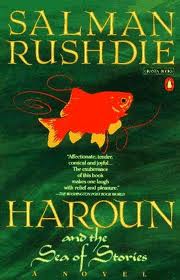Now that Olivia’s done with school for the summer, she’s in a reading and writing group organized by Alison Moncreif Bromage, a poet and former teacher at the Foote School in New Haven. They started yesterday with limericks and also with an old favorite of mine, Salman Rushdie’s Haroun and the Sea of Stories (1990). I read Rushdie’s fable when it first came out, and I also taught it in Los Angeles in the early ’90s. I remember having a class discussion of the novel interrupted by an aftershock of the Martin Luther King Day earthquake in January 1994. It’s more modest than The Satanic Verses (1988) and not as politically powerful as Midnight’s Children (1981), but I think it’s Rushdie’s most perfect novel, the ideal match of writer and subject, sentiment and vision. Olivia’s writing a page this week in response to its key question: “What is the use of stories that aren’t even true?”
What I hadn’t remembered, until I re-read the novel over the past few days, was how oceanic and ecocritical Haroun is. As if it anticipated or even shaped my own future intellectual trajectory!
Rushdie’s celebration of narrative fecundity, it turns out, is a hymn to the great god Ocean. Haroun learns this underwater:
The Source of Stories was a hole or chasm or crater in the sea-bed, and through that hole, as Haroun watched, the glowing flow of pure, unpolluted stories came bubbling up from the very heart of Kahani. There were so many Streams of Story, of so many different colours, all pouring out of the Source at once, that it looked like a huge underwater fountain of shining white light. In that moment Haroun understood that if he could preserve the Source from being Plugged, everything would eventually be all right again. The renewed Streams of Story would cleanse the polluted waters, and Khattam-Shud’s plan would fail (167-68).
The underlying fantasy goes back at least to Euripedes: “the sea can wash away all evil” (Iphigenia at Tauris). As Kimberly Patton has written, this phrase crystalizes an ancient ambivalence about oceanic space, which purifies any possible pollution. In this vision the ocean represents an void on which human efforts make no lasting marks. It’s easy enough to say in 2014 that this 1990-vision of Oceanic cleansing doesn’t hold. What’s harder to figure out is what happens next. “The sea demands a reckoning” (122), writes Patton.
It is no longer possible, in the age of the IPCC report and Hurricane Sandy, to believe in oceanic auto-renewal. But the moral dilemma at the center of Rushdie’s novel remains daunting:
Say what you will…but a Person must come before an Ocean, no matter how great the peril to both! (136)
That plea for the primacy of human lives over environmental cleansing comes from the idiot Prince Bolo, and the novel of course manages to save both Princess and Ocean. But Bolo’s question speaks to current tensions between human and nonhuman concerns. Must human desires, including the desire to pollute, come before the ocean, always? What happens when there are no more pure Streams to cleanse the great waters?
My favorite moment in Haroun comes near the end, after Khattam-Shud has been defeated, when the Walrus, chief of the Eggheads, summons our young hero for a private meeting in P2C2E House, where they build Processes-Too-Complicated-To-Explain. Haroun is granted one wish, the basic imperative of fable: “a happy ending” (201). The Walrus knows how to fix Haroun’s story:
“It is precisely because happy endings are so rare,” the Walrus continued, “that we at P2C2E House have learnt how to synthesize them artificially. In plain language: we make them up.” (201)
That punch-line inverts the Oceanic fantasy of endless Source; for the Walrus, the best stories are invented, not harvested. Rushdie’s novel braids together two visions of Story, one in which narrative flows from an endless more-than-natural Ocean, and another in which the best stories must be made up, invented, synthesized.
 The professor in me worries about the conflict between these two systems, the way that mythic certainties about cleansing oceans contribute to heedless pollution, and the converse way in which too much faith in technical ingenuity imagines the environmental crisis as something we can “solve” or “save.”
The professor in me worries about the conflict between these two systems, the way that mythic certainties about cleansing oceans contribute to heedless pollution, and the converse way in which too much faith in technical ingenuity imagines the environmental crisis as something we can “solve” or “save.”
But it’s hard not to admire Rushdie’s narrative verve. Writing under the Ayatollah’s fatwa, he sang story against silence, ocean against night, hope against politics. For a while I’ve been reading Shakespeare and premodern narratives in order to craft responses to a post-sustainability ecology. This novel merits a place on that shelf too.



The audiobook, with Rushdie reading, is absolutely fabulous.
I’ve not heard it. Hmm: I think we have a long-ish driving trip coming up. Thanks!